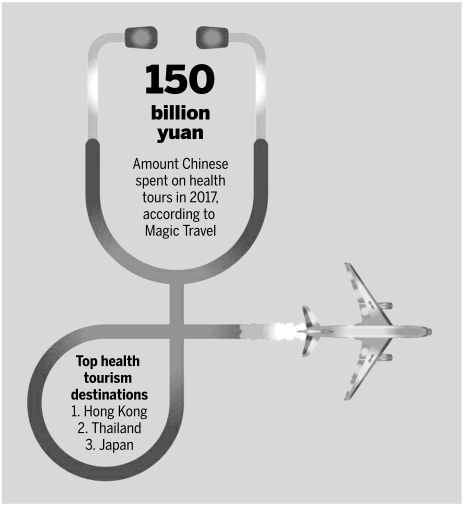 |
|
[Photo provided to China Daily] |
"Many were satisfied with the medical services and the fact that local doctors looked at the medical results in a very serious, professional way."
In addition, the travel agency arranges a five-star hotel, Michelin-rated dining and shopping, and visits to well-known tourist attractions are arranged in a five-day trip, the total cost being about 45,000 yuan.
Iwate prefecture, about 250 kilometers northeast of Tokyo, offers nine of the 11 kinds of hot springs in Japan.
In October the prefecture joined the Japanese preventive medicine association to develop precision health checks for Chinese visitors.
"A few Chinese have been through our program," says Cheng Shi, who works at Iwate Hotel and Resort.
The total cost is about 13,500 yuan-15,000 yuan, lower than the price of a similar procedure that some domestic high-end clinics offer, Cheng says.
Undergoing cosmetic surgery in South Korea, having anti-aging treatment in Switzer-land, or having genetic tests in the US have also become popular among China's nouveaux riches.
In 2016, about 100,000 Chinese went on medical trips to South Korea, where plastic surgery was the most common treatment sought, Ctrip says.
For those flush with cash, an anti-aging trip to Switzerland that can cost as much as 500,000 yuan is available. The Beijing Hanker Leisure Information Consulting Co has formed a partnership with Clinique La Prairie in Switzerland, a luxury medical retreat in Montreux, on the shores of Lake Geneva, that offers innovative science of cell therapy and holistic wellness.
Dozens of people have already booked the trip, which lasts seven days, says Peng Bo, chief executive of the Beijing company.
"We're now talking with people who are very interested in taking the trip," Peng says.
It aims to lift visitors out of underhealthy status through medical treatment as well as tours that take in golf, wine, museum visits and parents and children doing things together, Peng says.
Some developing countries such as India have also become popular holiday destinations thanks to relatively cheap medical services. The country's annual net takings from foreign patients was $3 billion in 2015, a report by Grant Thornton, an international consulting firm says. The figure is expected to reach $8 billion by 2020, it says.
Right now medical tourists could enjoy a rehabilitative yoga-themed vacation or a trip to the Taj Mahal.
The expanding wealthy class in China is behind the growing demand for medical tours, tourism industry experts say.
The number of Chinese with assets worth more than 10 million yuan was forecast to reach 1.58 million last year, based on a private asset report issued jointly by China Merchants Bank's private banking team and Bain & Company.
In a survey in 2016 by Hurun Research Institute, 60 percent of those high net worth individuals said they had taken medical tours and prefer overseas hospitals.
Experts forecast that medical tours that cost less than 100,000 yuan will become highly popular among rich Chinese.
The potential market has prompted conventional travel agencies to get into the market. Chinese spent more than 90 billion yuan on health tours in 2014, and the figure was 150 billion last year, says Su Ze, a manager with Magic Travel.
In 2014, Beijing Utour International Travel Service launched Magic Travel, which offers opulent health-conscious Chinese high-end medical services. The trips usually last three to 10 days.
"Most of our customers are the kinds of people who look ahead, and their annual family income is usually more than 1 million yuan," says Su.
The company says its revenue grew 50 percent last year compared with the year before.
Magic Travel has linked up with what it says are the finest medical institutes in the US, Germany, France, Switzerland and Southeast Asia, and it expects to link up with more.
"Of course we need to ensure that the services these institutes are offering is nothing but the best," Su says.
Magic Travel offers a stem-cell-injection treatment package, complete with five-star hotels and a helicopter sightseeing experience in Switzerland, reproduction treatment in the US, and health checks in Japan.
In November 2016, Ctrip announced that it was investing in IVF USA (a Shanghai-based expatriate facility offering IVF in the US) to engage in outbound medical tourism.
With more options available, more Chinese tourists are likely to take on health-related tours abroad.
After the undoubted success of Huang and his wife with their first medical holiday, another one is on the cards for them, and as the birth of a child nears, family matters are clearly on his mind.
"I might take my parents to get medical checkup abroad, just in case. It's good to know that if anything unexpected or complicated ever crops up, we have options for dealing with it."